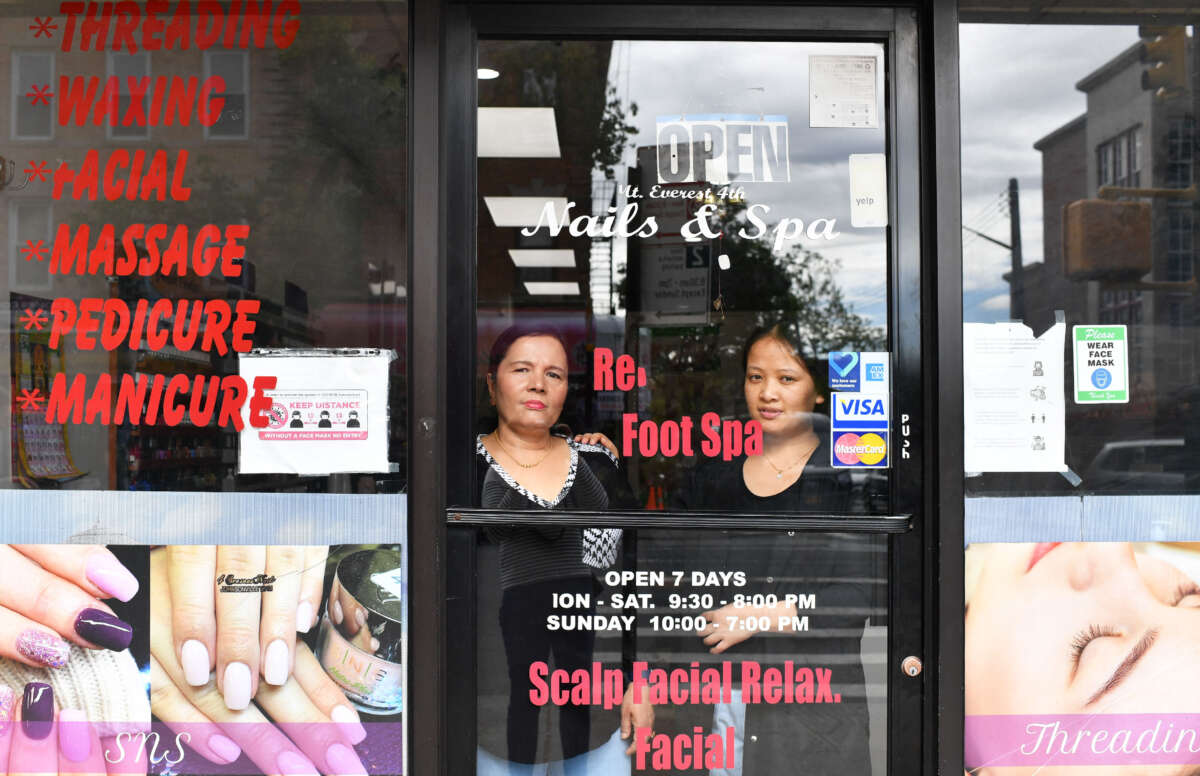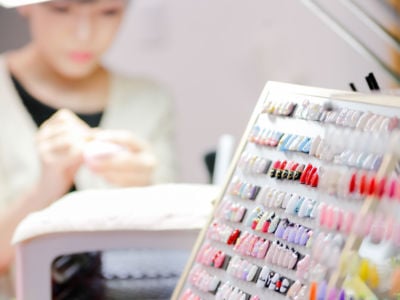A New York bill would give nail technicians a seat at the table to promote sector-wide workplace changes.
By Julia Kopstein ,
PublishedFebruary 13, 2024

Deepa Shrish Singgali (right) and Maya Bhusal Basnet meet at Deepa's workplace the Mt. Everest Nail & Spa in Ridgewood, Queens, New York, on May 11, 2022.
ANDREA RENAULT / AFP VIA GETTY IMAGES
Maya Bhusal Basnet started her career as a nail technician in Manhattan in 2009, introduced to the industry through her friends in the Nepali community. Over the past decade, she has worked at six or seven salons, always forced to leave due to deplorable conditions. Her health has suffered from exposure to toxic chemicals, her wages have furtively been robbed and isolating work conditions have eaten away at her mental health. Basnet is not alone in these experiences.
Nail salons are ubiquitous on New York City street blocks, yet their abundance tends to be overlooked. The windowed storefronts — often littered with posters of dazzling nails, or perhaps sleek eyebrows and lush lashes — often fade into obscurity, regardless of clients’ intimate relationships with their manicurists.
To put this in context, the 241 Starbucks shops located in New York City may evoke the sense that there is a cafe on every corner, but the numbers don’t even compare: New York City is home to 4,240 nail salons.
While working, Basnet hunches over plastic-covered pedicure basins or sterile manicure tables for hours at a time. She thinks about her children at home, who rarely get to spend time with their mother. Over Basnet’s shoulder, in plain view for the clients to see, is a poster, titled “New York and Federal Employee Notices.”
RELATED STORY
Nail salons are ubiquitous on New York City street blocks, yet their abundance tends to be overlooked. The windowed storefronts — often littered with posters of dazzling nails, or perhaps sleek eyebrows and lush lashes — often fade into obscurity, regardless of clients’ intimate relationships with their manicurists.
To put this in context, the 241 Starbucks shops located in New York City may evoke the sense that there is a cafe on every corner, but the numbers don’t even compare: New York City is home to 4,240 nail salons.
While working, Basnet hunches over plastic-covered pedicure basins or sterile manicure tables for hours at a time. She thinks about her children at home, who rarely get to spend time with their mother. Over Basnet’s shoulder, in plain view for the clients to see, is a poster, titled “New York and Federal Employee Notices.”
RELATED STORY

The Dangerous, Low-Paid World of Nail Salons
Regulation of salon chemicals and workplace practices is scarce, and many workers fear speaking out.
By Bryce Covert , TRUTHOUTNovember 29, 2018
Most salons in New York City have this poster; they exist in perhaps even more frequency than the notorious green Starbucks logo. The poster’s fine print and government stamps serve as a nod to customers that the salon is compliant with labor, health and safety measures, possibly to rid them of fear of the exploitation of the workers handling their routine appointments.
Basnet has found that these posters, unfortunately, are nothing more than a display. Nail salons in the United States are a booming multibillion-dollar industry, but nearly 8 in 10 of their workers earn only two-thirds of the median full-time wage. Of these workers, 81 percent are women, and 79 percent are foreign-born, primarily immigrants and refugees from the Asian diaspora. Basnet is paid below minimum wage for the grueling hours she works, without even a break for lunch.
In 2014, the New York State Labor Department, in conjunction with a few other agencies, conducted its first nail salon sweep ever. The Labor Department investigated 29 salons and found 116 wage violations.
But the issues Basnet faces don’t end with wage theft. While she ruminates on her lack of a pension plan; worries about being at work, away from her family on public holidays; or runs through her budget when accounting for less hours she is offered in cold weather, Basnet and her colleagues also must grapple with the knowledge of unsafe and hazardous conditions in salons. She says many of her friends in the industry could not get pregnant, and they attribute it to their exposure to unsafe chemicals in nail salons. Hauntingly, in New York, 20 percent of nail technicians reported that they have had issues with their reproductive health, and 25 percent of nail technicians reported complications during their pregnancy. Nail technicians are also more than three times as likely to have babies born with congenital disabilities compared to the general population.
Basnet and her colleagues point to the New York and Federal Employee Notices sign, demanding their bosses, business owners and legislators take action to preserve salon workers’ dignity and livelihood. In addition to calling for more inspections of the noxious salon environments, activists like Basnet are pushing legislation to fix the wide variety of issues plaguing the industry, and for efficient implementation. Time and time again, promises by legislators go unfulfilled.
Organizing Salons Without a Union
At the break of dawn, nail technicians like Basnet mobilize for strenuous days. At the same time, Starbucks employees tie up their aprons, and ready themselves for a fast-paced morning rush. These are the Starbucks that exist on the same streets, whose green logos appear in between storefronts of local salons. Both sectors, no matter how massive in scope, face barriers ranging from outdated labor laws to the inadequacy of federal protections. However, when it comes to organizing for better pay and working conditions, the labor organizing momentum among Starbucks workers stands in stark contrast to the atomized plight of nail salon workers, underscoring how different industries encounter distinct challenges.
Starbucks’s union, Starbucks Workers United, has been organizing store by store for better wages, contracts and hours. Nail salon workers, on the other hand, cannot accomplish the feats of Starbucks Workers United in the same way. There is no conceivable way to organize these salons shop by shop.
Basnet believes the best way to solve these problems would be for New York State to pass the Nail Salon Minimum Standards Council Act. Daisy Chung, director of the New York Healthy Nail Salons Coalition, the organization spearheading this legislation, describes the bill as an effort to create a permanent sectoral council — giving nail salon workers and business owners a seat at the table with government representatives to recommend changes. Instead of a conventional union, the board would support and promote sector-wide changes.
With the creation of this council, nail salon workers, owners and legislators can come together and set standards across the industry without worrying about pitting shop against shop. Chung even notes that Starbucks Workers United-Downstate NY supports the bill.
This sectoral council would not be the first of its kind. Across the country, from nursing home employees in Minnesota, to fast food workers in California, to rideshare drivers in Massachusetts, workers are mobilizing to develop their own versions of these standards boards and councils.
Since 2015, Basnet has been a worker fellow at Adhikaar for Human Rights and Social Justice, facilitating discourse between other Nepali-speaking salon workers about their rights and helping them get their licenses to work at salons in the state. To Basnet, the Nail Salon Minimum Standards Council Act serves as a beacon of hope. Despite not having a powerful union to bring them together, New York City’s nail salon workers are urgently and steadily finding ways to fight for sector-specific solutions to the problems that plague their industry.
JULIA KOPSTEIN is a Brooklyn-based writer specializing in labor and the economy.
No comments:
Post a Comment